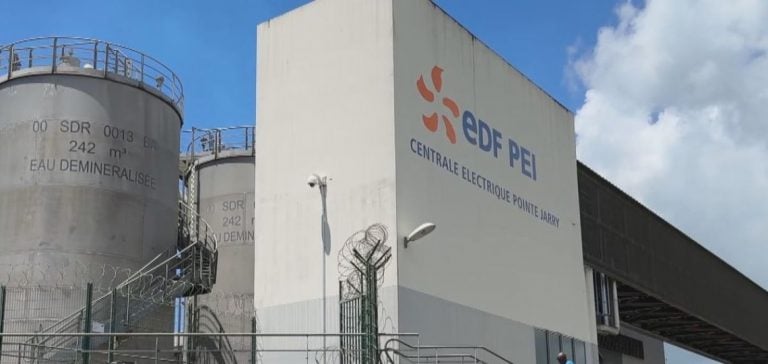For several days now, Guadeloupe has been experiencing power cuts caused by a strike by EDF Production Électrique Insulaire (PEI) employees.
This industrial action, triggered by the CGTG energy branch, is based on a dispute over the application of an agreement signed in 2023.
This agreement, reached after 61 days on strike, aimed to regularize the employment contracts of the agents and to pay salary arrears over a five-year period.
Despite this agreement, the union accuses EDF PEI management of failing to meet its commitments.
According to Jimmy Thélémaque, General Secretary of FE-CGTG, management is refusing to produce compliant pay slips.
This refusal led to a partial paralysis of electricity production on the island.
Indeed, the archipelago’s main diesel power plant, which provides 70% of local electricity, is shut down, forcing EDF to carry out rotating load shedding to avoid overloading the network.
Economic and social consequences of power cuts
Power cuts, which affect up to 115,000 households during peak load periods, disrupt not only the daily lives of residents, but also the island’s economic activity.
The lack of electricity leads to water cuts, closing schools and slowing down the operation of many businesses.
Telephone operators are also reporting malfunctions in their services, adding to the general disorganization.
The local economic sector, already weakened by its dependence on fossil fuels, is feeling the full impact of the strike.
Indeed, such an interruption in electricity production severely affects businesses, particularly those operating in energy-intensive sectors such as industry and technology services.
Prolonged power cuts limit production capacity, disrupt supply chains and increase operating costs for local businesses.
Limited progress in negotiations
On Thursday, after several days on strike, negotiations resumed between the CGTG and EDF PEI management.
The union announced that several of the plant’s motors had been brought back on line, enabling electricity to be restored to some of the households affected.
However, 13,400 customers remain without power, underlining that the situation remains tense.
Discussions are currently focusing on the regularization of wages and the compliance of pay slips.
Despite a partial resumption of activity, the CGTG is sticking to its guns, threatening further action if its demands are not met by the deadline.
For its part, EDF PEI management has refrained from making any public comment while negotiations are underway.
An energy system under pressure
The current crisis highlights the structural weaknesses of Guadeloupe’s electricity system.
Dependence on an aging diesel power plant, combined with a tense social climate, demonstrates the fragility of the island’s electricity supply.
Local authorities have pointed out that temporary solutions, such as importing electricity from other neighboring islands or territories, are not viable in the long term due to logistical constraints and high costs.
The situation also raises questions about the resilience of Guadeloupe’s electricity grid, which is mainly powered by fossil fuels.
Although decarbonization initiatives are underway, they are not yet sufficient to reduce dependence on fossil fuels in island territories.
The development of local renewable energy sources and diversification of supplies remain priorities for players in the sector.
Towards the necessary modernization of power generation
For professionals in the sector, the strike highlights the need for far-reaching reform of electricity generation in France’s island territories.
Guadeloupe, like many other islands, still relies heavily on obsolete infrastructure and fossil fuels to meet its needs.
The diesel power plant, the main source of production, is no longer adapted to the growing needs of a developing population and economy.
The current industrial dispute also highlights the need for more rigorous management of industrial relations within energy companies.
Tensions between unions and management have become frequent in recent years, compromising the continuity of essential services.
The modernization of the sector must involve a better integration of social demands in order to guarantee stable production and supply.
Guadeloupe’s energy future therefore hinges on structural reforms to improve network resilience, diversification of energy sources, and more proactive management of labor relations to avoid prolonged interruptions to public services.






















